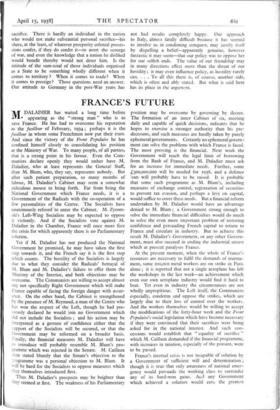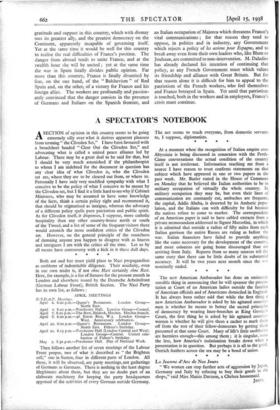FRANCE'S FUTURE
M11/1 DALADIER has waited a long time before • appearing as the " strong man " who is to save France. He has had to overcome his reputation as the fusilleur of February, 1934 ; perhaps it is the fusilleur in whom some Frenchmen now put their trust. And since the victory of the Front Populaire he has confined himself closely to consolidating his position at the Ministry of War. To many people, of all parties, that is a strong point in his favour. Even the Com- munists declare openly they would rather have M. Daladier, who at least represents the General Staff, than M. Blum, who, they say, represents nobody. But after such patient preparation, so many months of labour, M. Daladier's Cabinet may seem a somewhat ridiculous mouse to bring forth. Far from being the National Government which France needs, it is a Government of the Radicals with the co-operation of a few personalities of the Centre. The Socialists have unanimously refused toenter the Cabinet. M. Zyrom- ski's Left-Wing Socialists may be expected to oppose it violently. And if the Socialists vote against M. Daladier in the Chamber, France will once more face the crisis for which apparently there is no Parliamentary solution.
Yet if M. Daladier has not produced the National Government he promised, he may have taken the first step towards it, and the French say it is the first step which counts. The hostility of the Socialists is largely due to what they consider the Radicals' betrayal of M. Blum and M. Daladier's failure to offer them the Ministry of the Interior, and both objections may be overcome. The Communists are willing to accept almost any not specifically Right Government which will make France capable of facing the foreign danger with assur- ance. On the other hand, the Cabinet is strengthened by the presence of M. Reynaud, a man of the Centre who has won the respect of the Left, though he had pre- viously declared he would join no Government which did not include the Socialists ; and his action may be interpreted as a gesture of confidence either that the support of the Socialists will be secured, or that the Government may be reformed on a broader basis. Finally, the financial measures M. Daladier will have to introduce will probably resemble M. Blum's pro- gramme which was rejected in the Senate. M. Caillaux then stated bluntly that the Senate's objection to the programme was a personal objection to M. Blum. It will be hard for the Socialists to oppose measures which they themselves introduced first.
Thus M. Daladier's prospects may be brighter than they seemed at first. The weakness of his Parliamentary position may be overcome by governing by decree. The formation of an inner Cabinet of six, meeting daily and capable of quick decisions, indicates that he hopes to exercise a stronger authority than his pre- decessors, and such measures are hardly taken by purely ephemeral governments. Certainly no ephemeral govern- ment can solve the problems with which France is faced. The most pressing is the financial. Next week the Government will reach the legal limit of borrowing from the Bank of France, and M. Daladier must ask for an increase for immediate needs. Further, some k300,000,000 will be needed for 1938, and a defence !oan will probably have to be raised. It is probable that some such programme as M. Blum's, including measures of exchange control, registration of securities to prevent tax evasion, and perhaps a levy on capital, would suffice to cover these needs. But a financial reform undertaken by M. Daladier would have an advantage denied to M. Blum ; a Government strong enough to solve the immediate financial difficulties would do much to solve the even more important problem of restoring confidence and persuading French capital to return to France and circulate in industry. But to achieve this result M. Daladier's Government, or any other Govern- ment, must also succeed in ending the industrial unrest which at present paralyses France.
At the present moment, when the whole of France's resources are necessary to fulfil the demands of rearma- ment, some 200,000 metal workers are on strike in Paris alone ; it is reported that not a single aeroplane has left the workshops in the last week—an achievement which even our own aeroplane industry would find it hard to beat. Yet even in industry the circumstances are not wholly unpropitious. The Left itself, the Communists especially, condemn and oppose the strikes, which are largely due to their loss of control over the workers. And the workers themselves would be willing to accept the modifications of the forty-hour week and the Front Populaire's social legislation which have become necessary if they were convinced that their sacrifices were being asked for in the national interest. And such con- cessions would establish that " equality of sacrifice " which M. Caillaux demanded if the financial programme, with increases in taxation, especially of the peasant, were to be passed.
France's internal crisis is not incapable of solution by a Government of sufficient will and determination ; though it is true that only awareness of national emer- gency would persuade the working class to surrender any of its hard-won gains. And any Government which achieved a solution would earl' the greatest gratitude and support in this country, which with dismay sees its greatest ally, and the greatest democracy on the Continent, apparently incapable of governing itself. Yet at the same time it would be well for this country to realise the real difficulties of France's position. The danger from abroad tends to unite France, and at the twelfth hour she will be united ; yet at the same time the war in Spain fatally divides public opinion. Far more than this country, France is fatally disunited by fear, on the one hand, of the " Bolshevism " of Red Spain and, on the other, of a victory for Franco and his foreign allies. The workers are profoundly and passion- ately convinced that the danger consists in the presence of Germans and Italians on the Spanish frontier, and an Italian occupation of Majorca which threatens France's vital communications ; for that reason they tend to oppose, in politics and in industry, any Government which rejects a policy of les avions pour Espagne, and to break away even from their own leaders who, like Blum or Jouhaux, are committed to non-intervention. M. Daladier has already declared his intention of continuing that policy, as any French Government must which values its friendship and alliance with Great Britain. But for that reason alone it is difficult for him to appeal to the patriotism of the French workers, who feel themselves and France betrayed in Spain. Yet until that patriotism is touched, both in the workers and in employers, France's crisis must continue.







































 Previous page
Previous page